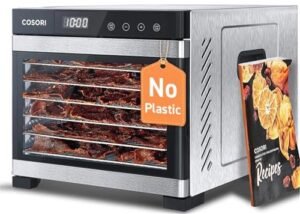Table of Contents
TogglePart 1: Introduction and Basics of Refreezing Smoked Food
Refreezing smoked food is a topic that often raises questions about food safety and quality. In this article, we delve into the science behind freezing and refreezing food, the risks associated, and the factors to consider before you decide to refreeze your smoked food.
The process of freezing and refreezing food involves a complex interplay of temperature, moisture, and time. When food is frozen, the water content turns into ice, slowing down the growth of bacteria and preserving the food. However, when the food is thawed and refrozen, it can lead to changes in texture and flavor due to the breakdown of cell structures. 1
There are certain risks associated with refreezing smoked food. The primary concern is the potential growth of harmful bacteria during the thawing process. If the food is not handled properly or is left at room temperature for too long, it can lead to foodborne illnesses. Moreover, the quality of the food can also be compromised, by changes in texture and flavor. 2
Before you decide to refreeze your smoked food, there are several factors to consider. These include the type of food, the length of time it has been thawed, and the temperature at which it was stored. It’s also important to consider the quality and safety of the food before it was first frozen.
A Detailed Guide to Refreezing Specific Smoked Foods
Refreezing Smoked Salmon: A Detailed Guide
Smoked salmon is a delicacy enjoyed by many. If you have leftover smoked salmon that you wish to refreeze, it’s crucial to ensure that it has been stored properly. The salmon should have been refrigerated promptly after thawing and not left at room temperature for more than two hours. When refreezing, make sure to wrap the salmon tightly to prevent freezer burn.
Refreezing Smoked Meat: What You Need to Know
Smoked meat, such as smoked ham or smoked beef, can generally be refrozen, provided it has been handled and stored properly. The meat should be refrigerated soon after thawing and should not be left at room temperature for extended periods. When refreezing, it’s advisable to portion the meat into smaller servings to prevent repeated thawing and refreezing.
Refreezing Smoked Poultry: The Do’s and Don’ts
When it comes to smoked poultry, the same general rules apply. The poultry should be refrigerated promptly after thawing and should not be left at room temperature for more than two hours. It’s also important to note that the quality of the poultry may be affected by refreezing, with potential changes in texture and flavor.
Refreezing Smoked Seafood: Essential Tips
Smoked seafood, such as smoked shrimp or smoked mussels, can be more delicate and may not fare as well when refrozen. If you decide to refreeze smoked seafood, ensure that it has been stored properly after thawing, preferably in the refrigerator and not at room temperature. When refreezing, wrap the seafood tightly to prevent freezer burn.
Part 3: FAQs and Conclusion
Frequently Asked Questions About Refreezing Smoked Food
- Is it safe to refreeze smoked food?
Yes, it is generally safe to refreeze smoked food, provided it has been handled and stored properly. However, the quality of the food may be affected, with potential changes in texture and flavor. - How long can smoked food be left out before it is unsafe to refreeze?
Smoked food should not be left at room temperature for more than two hours. If it has been, it’s generally not safe to refreeze. - Does refreezing smoked food affect its quality?
Yes, refreezing smoked food can lead to changes in texture and flavor due to the breakdown of cell structures during the freezing and thawing process. - What is the best way to store smoked food before refreezing?
Smoked food should be refrigerated promptly after thawing and stored at a temperature below 40°F (4°C). When refreezing, the food should be wrapped tightly to prevent freezer burn.
Tips for Safely Refreezing Smoked Food
When it comes to refreezing smoked food, safety and quality are paramount. Here are some tips to ensure you do it right:
- Always refrigerate smoked food promptly after thawing.
- Do not leave smoked food at room temperature for more than two hours.
- When refreezing, wrap the food tightly to prevent freezer burn.
- Consider portioning the food into smaller servings to prevent repeated thawing and refreezing.
- Always check the quality of the food before refreezing. If it smells off or shows signs of spoilage, do not refreeze.
Conclusion: The Final Verdict on Refreezing Smoked Food
In conclusion, it is generally safe to refreeze smoked food, provided it has been handled and stored properly. However, the quality of the food may be affected, with potential changes in texture and flavor. It’s important to follow food safety guidelines to minimize the risk of foodborne illnesses. Always remember, when in doubt, it’s better to err on the side of caution. If you’re unsure about the safety or quality of your smoked food, it’s best not to refreeze.
For more detailed information on food safety and storage, you can refer to resources such as the USDA Guidelines on Refreezing Food and the Food Safety Guidelines for Cold Storage.






